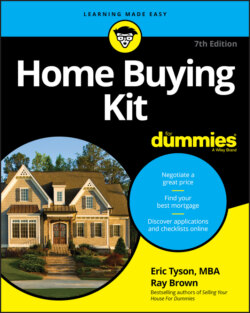Читать книгу Home Buying Kit For Dummies - Eric Tyson - Страница 34
TRIMMING THE FAT FROM YOUR BUDGET
ОглавлениеMost people planning to buy a home need to reduce their spending in order to accumulate enough money for the down payment and closing costs and to create enough slack in their budget to afford the extra costs of homeownership. (Increasing your income is another strategy, but that’s usually more difficult to do.) Where you decide to make cuts in your budget is a matter of personal preference — but unless you’re independently wealthy or a spendthrift, cut you must.
First, get rid of any and all consumer debt — such as that on credit cards and auto loans. Ridding yourself of such debt as soon as possible is vital to your long-term financial health. Consumer debt is as harmful to your financial health as smoking is to your personal health. Borrowing through consumer loans encourages you to live beyond your means and do the opposite of saving — call it “dis-saving” (or deficit financing, as those in Washington, D.C., say). The interest rates on consumer debt are high, and unlike the interest on a mortgage, the interest on consumer debt isn’t tax-deductible, so you bear the full brunt of its cost.
Should you have accessible savings to pay down your consumer debts, by all means use those savings. You’re surely paying a higher interest rate on such debt than you’re earning from interest on your savings. Plus, interest on your savings is taxable. Just be sure you have access to sufficient emergency money through family or other means.
If you lack the savings to make your high-cost debts disappear, start by refinancing your high-cost credit-card debt onto cards with lower interest rates. Then work at reducing your spending to free up cash to pay down these debts as quickly as possible. And if you have a tendency to run up credit-card balances, consider getting rid of your credit cards and obtaining a Visa or MasterCard debit card. These debit cards look like credit cards and are accepted the same as credit cards by merchants, but they function like checks. When you make a purchase with a debit card, the money is deducted from your checking account within a day or two.
Trim unnecessary items from your budget. Even if you’re not a high-income earner, some of the things you spend your money on aren’t necessities. Although everyone needs food, shelter, clothing, and healthcare, people spend a great deal of additional money on luxuries and nonessentials. Even some of what we spend on the “necessity” categories is partly for luxury.
Purchase products and services that offer value. High quality doesn’t have to cost more. In fact, higher-priced products and services are sometimes inferior to lower-cost alternatives.
Finally, buy in bulk. Most items are cheaper per unit when you buy them in larger sizes or volumes. Wholesale superstores such as Costco and Sam’s Club and chain discount stores like Target offer family sizes and competitive pricing. Also watch for sales at local grocery and discount stores.
Financial software packages, such as Quicken, can help with the task of tracking and analyzing your spending, but old-fashioned paper and pencil work fine, too. What you need to do is assemble information that shows what you typically spend your money on. Access your checking account records, credit- and charge-card bills and transactions, online bill payment and banking summary, job pay stub, and your most recent tax return.
Whether you use our handy-dandy table or your own software isn’t important. What does matter is that you capture the bulk of your spending. But you don’t need to account for 100 percent of your spending and track every last penny (or even every last dollar). You’re not designing an airplane or performing a financial audit for a major accounting firm here!
As you collect your spending data and consider your home purchase, think about how that purchase will affect and change your spending and ability to save. For example, as a homeowner, if you live farther away from your job than you did when you rented, how much will your transportation expenses increase? Also note that in Chapter 3, we walk you through estimating homeownership expenses, such as property taxes, insurance, maintenance, and the like.
